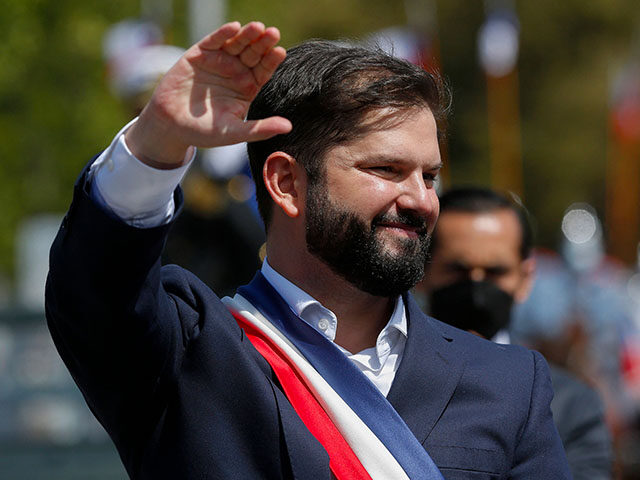Chilean far-left President Gabriel Boric defended on Thursday the need to limit economic dependence on China during an encounter with representatives of French business.
China is Chile’s top trade partner, accounting for 40 percent of Chilean exports, as a result of years of prior presidents inviting Chinese communist investment into the country.
Boric was invited by the Movement of the Enterprises of France (MEDEF) to participate in a conference titled “Chile, Solutions for the Energy Transition,” during which the far-left president asserted that countries need to diversify their exports to limit their dependence on great powers, using Russia’s ongoing invasion of Ukraine as an example.
“Dependence must be limited at a time when Russia’s cruel, unjust, and illegal invasion of Ukraine showed the fragility of depending mainly on a single source, in this case energy,” he said.
“It also happens to us in some way,” he continued. “Today, in another sense, 40 percent of our exports are to China. Today China is our main trading partner, we have good relations with China and it is one of the main investors in Latin America and South America, and increasingly so. But we also know that in the current geopolitical context it is necessary to diversify our sources of income and the destinations of our products.”
Chile’s Central Bank reported in February that China accounted for 39.4 percent of Chile’s total exports during 2022, totaling $38.44 billion, followed by the United States with 19.3 percent. Chilean exports to the U.S. totaled $13.58 billion during 2022.
Chile’s main exports to China are minerals such as copper and lithium, both indispensable in the manufacturing of electric vehicles. Non-mineral exports to China include fruits such as cherries and grapes, wine, and seafood.
Chile, which houses two of the world’s largest copper mines, was the world’s top producer of the mineral in 2022, responsible for 27 percent of all global copper production. In recent years, China has exerted increased pressure upon Chile to allow it moe control over the nation’s copper and lithium industries. In one significant instance, Chinese industry attempted to gain majority control of one of the country’s copper yields before it had even begun operating between 2005 and 2008 during the socialist governments of Ricardo Lagos and Michelle Bachelet.
While an ardent supporter of the “energy transition” away from fossil fuels – which would require investments in the China-dominated solar and wind industries – Boric has used his time in office to protect Chile’s green industries from total Chinese control. In April, Boric announced his administration’s plans to nationalize Chile’s lithium industry, creating a new state-owned company that will take control of all lithium production in the country. The Chinese-state run newspaper Global Times criticized Boric’s plan shortly after its announcement, claiming that it will negatively affect ties to Beijing.
During his conference with the French MEDEF businessmen this week, Boric referenced his lithium nationalization plans, stating that the plans had been “well received” abroad.
“We want our lithium to be valuable in the eyes of the world because, in addition, it is an industry that makes sense for the energy transition and because it represents a production model that is more respectful of the environment and the communities,” he said.
Boric’s calls to limit economic dependence on China stand in stark contrast to other leftist governments in the region that have further pushed their respective countries towards China over the past year – such as Brazil, Argentina, and Honduras.
Brazilian radical leftist President Luiz Inácio Lula da Silva signed 15 agreements with communist Chinese dictator Xi Jinping in April during his official visit to Beijing, adding to a previously signed agreement in March to no longer use the U.S. dollar to conduct trade, opting to use the Chinese yuan and Brazilian real instead.
Argentina, under the leftist presidency of Alberto Fernández, signed a similar deal with China to use the yuan to conduct trade. The agreement follows years of increased pressure from China, which seeks to gain control of Argentina’s strategic sectors while taking advantage of the country’s precarious economic situation.
Honduras, under the administration of radical leftist President Xiomara Castro, joined China’s predatory Belt and Road Initiative (BRI) in June after cutting ties with Taiwan and establishing diplomatic ties with China in March. The Belt and Road Initiative is a Chinese debt trap program in which the Chinese government offers countries infrastructure project loans, often under unfavorable terms, which are then used to pay Chinese companies to work on the agreed projects. Due to the predatory nature of the loans, the countries eventually find themselves unable to pay them back, allowing China to seize the projects or exert pressure and influence return.
Boric traveled to France as part of a nine-day European tour between July 12-21 that also saw him visit Spain, Belgium, and Switzerland. Boric participated in the EU-CELAC summit, a gathering of members of the European Union and members of the Community of Latin American and Caribbean States (CELAC) held in Brussels this week. The EU-CELAC summit also prompted discord between Boric and his fellow leftists, as Lula, his Brazilian peer, criticized Boric as a “hasty young man” for demanding that Latin American leaders stake out a clear position on the Russian invasion of Ukraine.
Christian K. Caruzo is a Venezuelan writer and documents life under socialism. You can follow him on Twitter here.

COMMENTS
Please let us know if you're having issues with commenting.